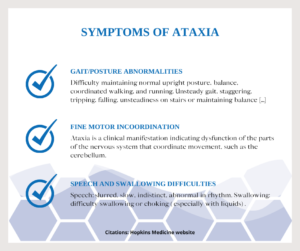Ataxia – The Mental Side Effects
I’m going to tell you something that’s going to shock you to the core; having ataxia isn’t easy in any way, shape or form. Are you surprised? The loss of balance and having to accept that life will be very different for you in so many ways you couldn’t even imagine from learning to use a mobility aid to managing a pharmacy’s worth of meds. But that’s just the physical side, no one really mentions the toll it has on your mental health.
When the Symptoms Started

I first started feeling wobbly at around the age of 20. I was at university and enjoying the nightlife that goes with it when I began to notice I couldn’t walk and hold a drink at the same time and I couldn’t control myself on the dance floor (and not in a good way). I couldn’t understand what was happening but was determined to carry on regardless. It would just sort itself out right?
I visited a couple of doctors over the next couple of years but was usually dismissed as a party-girl who drank too much and was once even told that “some people are just like that”. Eventually I was taken seriously at the age of 22 and the word “ataxia” started to be thrown around.
After University
After university I moved to Brighton UK and by this time things were starting to get more noticeable and this is when my mental health began to decline. I had to explain to a new group of friends that there was something wrong but that I wasn’t really sure what it was and seemingly neither did any of the healthcare professionals I encountered. I had an amazing network of friends in general, some thought it was appropriate to make a joke of it and I laughed along but really it just added to the feeling of being alone. I was the odd one out. Why me?
I began to feel more unstable day to day, I worked but it wasn’t easy as I was often fatigued from just doing day to activities and this lead to time off which resulted in dreaded meetings with HR. I was worried about being so unfit for work but had no idea how I would be able to live if I didn’t. Due to the fact I had been walking to one side for so many years I was beginning to experience issues with my back, feet and joints which only added to my increasing inability to leave the house.
Diagnosis: Friedrich’s Ataxia
Eventually in 2012 I was referred to a specialist in London who was finally able to confirm my condition as Friedrich’s Ataxia. It was good to be able to give a name to my wobbles but it didn’t stop them getting worse and it was around this time I started having major social anxiety and panic attacks. I didn’t trust my ability to cross the road or hold my own in a crowd without falling over and my condition got much worse in the dark. I began to walk with a stick part time and then eventually full time a few years later.
Resistance
I resisted using a mobility aid for as long as possible because who wants to use a walking stick in their 30s? They’re for old people traditionally and only added to my social anxiety about the whole thing. I had just gotten out of a bad relationship and was feeling hopeless which resulted in a couple of years of severe depression and a reliance on drinking in the evenings to “cheer me up”, guess what? It only made things worse.
Then in 2018 things began looking up, I started working part-time and having just turned 35 was able to get my own flat with an increase in my housing benefits. I stopped drinking and started to enjoy my life more for the most part because I stopped worrying about what people thought of me as a disabled person. For this I have many positive Instagram accounts by people with disabilities to thank as well as those that promote body positivity.
Opening Up About Ataxia
Of course this hasn’t made my condition any better but I’m not afraid to talk about it and how it has affected my life anymore. I have an arsenal of mobility aids in a range of colours and some that even have names (Marge the mobility scooter and Shirley the rollator) that have only made my life better and which I regret not using sooner. It’s been tough getting to a place of acceptance but now I’m there I feel stronger for it and prepared to face the challenges of ataxia head on.
Thank you Kate Annetts for sharing your story. I hope this encourages other to also open up about the many side effects of Ataxia and including the mental implications. Follow Kate on instagram @katekataxia to find out more.
If you would also like to get involved and share your experience with Ataxia or another rare condition, please get into contact with us through our social media.
